COMMITTED TO DEVELOPMENTS IN HUNGARY






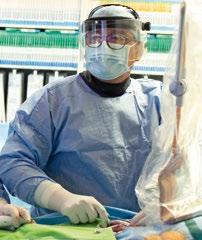
Facility management is one of the most important sectors of the Hungarian economy. Diplomacy&Trade presents a compilation on this sector, highlighting the activities of LEO FM, the umbrella association of this profession in this country, which works on tackling challenges like the pandemic or the Russian war in Ukraine, and on raising the overall standard in this industry. The focus section also includes the presentation of the major facility management companies in Hungary. see compilation on pages 08-13
For the first time, a Hungarian university has been ranked in the top 250 of the Times Higher Education (THE) world rankings. The Budapest-based Semmelweis University has improved 41 places on last year's result to make it to the top 250. It is ranked 64th among the higher education institutions of EU countries, typically outranked by German, French and Belgian universities. see article on pages 16
Environmental initiatives, biodiversity and nature protection; prevention and management of natural disasters; rehabilitation and modernization of basic infrastructure and improvement of the environment – just a few areas where the first Swiss Contribution helped Hungarians in the northern parts of the country in the past decade. Now, the two countries have signed the 2nd Swiss Contribution agreement that will focus on vocational education and training, research cooperation, SME support, fighting against human trafficking, investment in energy efficiency and renewable geothermal energy, water and wastewater management, health and social protection and minorities.
The Focus in this issue is on facility management, which is one of the most important sectors of the Hungarian economy, accounting for approximately 6-8% of GDP. Here, we present the National Association of Facilities Management and Building Management Service Providers, the umbrella association of this profession in Hungary, that works on tackling the challenges of our times and on raising the overall standard in this industry, as well as several of the most important service providers in this industry.
Our latest political analysis looks at the winners and losers in the recent American congressional elections. The conclusion is that “democracy has won.” The U.S. has remained a society of 50-50, though. This division is likely to surface again next year with the preliminary phase of the 2024 congressional and presidential elections resulting in further winners and losers, according to our analyst.
For the first time, a Hungarian university has been ranked in the top 250 of the Times Higher Education (THE) world rankings. The Budapest-based Semmelweis University has improved 41 places on last year's result to make that achievement.

WittyLeaks is authored by the Greek Ambassador upon completing his tenure in Hungary, leaving the country “with pleasant memories” and reflecting on memories of the centuriesold relations between the Hungarian and Greek peoples visible here.
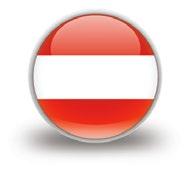
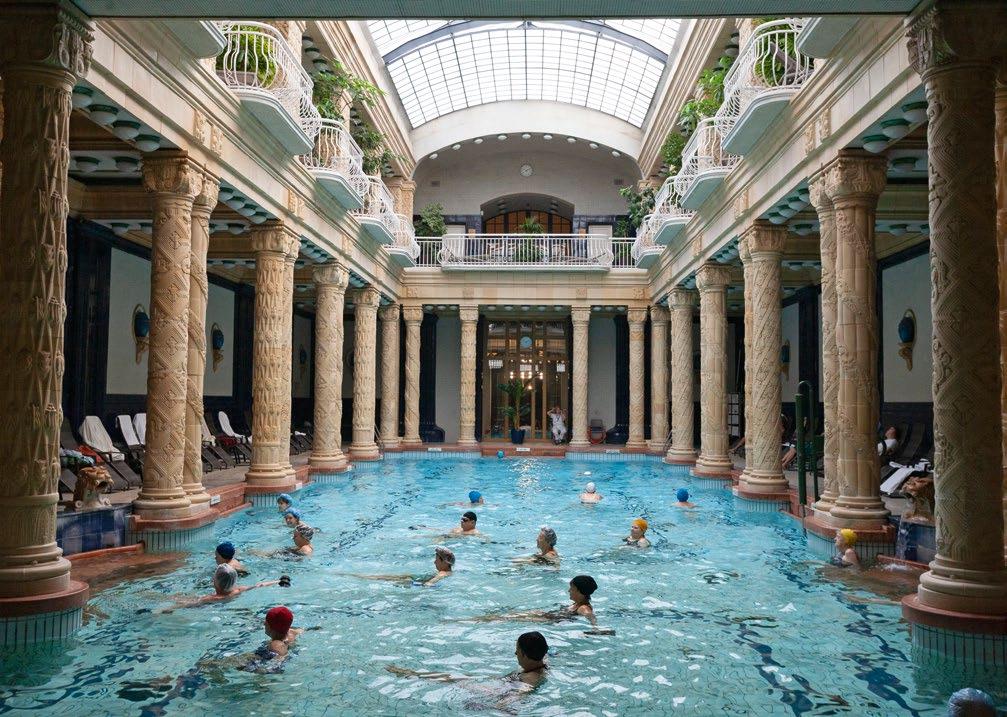
On the wine page, you can read about Chateau Mate winery where 'Mate' is not what you think and the wine produced there is not natural and has no intention to become one… As we wind up this year, we are left with more questions than answers. Business and social planning is really a guessing game as we face the multiple challenges of war, inflation, virus… and more! This is the time for diplomatic leadership and business acumen. We wish you happy holidays and a healthy New Year!
 Peter Freed PUBLISHER
Peter Freed PUBLISHER
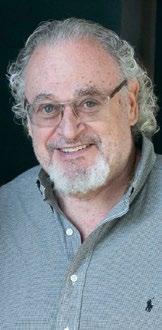

With a performance of five petaflops, Komondor, the newest and most powerful supercomputer in Hungary, debuts in the world's TOP 500 supercomputers. The system, which is operated by the Governmental Information-Technology Development Agency (KIFÜ), will soon be available to users after testing.

The installation of this newest Hungarian supercomputer started in September at the Supercomputer Center of the University of Debrecen, E Hungary. It has a performance of 5 HPC petaflops, which includes dedicated Artificial Intelligence and Big Data partitions in addition to high-capacity processor and graphics computing units.

Three-quarters of Hungarians say the war in Ukraine and high energy prices should accelerate the green transition, according to the latest yearly European Investment Bank (EIB) Climate Survey.
After a challenging year in which Russia’s invasion of Ukraine sparked an ongoing energy crisis and accelerated inflation all over Europe, and a summer marked by record heatwaves and droughts, Hungarians have become even more acutely aware of the impact of climate change and the need for urgent action. 86% say that, if we do not drastically reduce our consumption of energy and goods in the coming years, we will be heading for a global catastrophe. 71% want highly polluting goods and services such as air travel and sport utility vehicles (SUVs) to be taxed more heavily to account for their environmental cost. 65% want energy prices to be tied to consumption, with those consuming the most being charged more.
91% of Hungarians now say they feel the effects of climate change on their daily lives (an increase of 4% since 2021). 86% think that, if we do not drastically reduce our consumption of energy and goods in the coming years, we will be heading for a global catastrophe. At the same time, 90% feel that the government is reacting too slowly, and only 35% think that Hungary will succeed in substantially reducing its carbon emissions by 2030.
Former basketball player Réka Cserny has been inducted into the Harvard Varsity Club (HVC) Hall of Fame. The Hungarian athlete studied at the US university between 2002 and 2005, where she achieved outstanding success as a member and captain of the women's basketball team.

The HVC Hall of Fame is open to athletes who have graduated from Harvard 15 years ago and have demonstrated outstanding performance in their sport over a number of years.
At the HVC website, Réka Cserny is quoted as saying that "it is a great honor to be inducted into the Harvard Varsity Club Hall of Fame. I am grateful for this occasion because it has given me the opportunity to slow down and go back in time a bit and reflect on my time with Harvard Basketball and how I got there."
She added that "I am forever grateful to my family, my coaches, my teammates and my mentors, without whom I would not be receiving this award. My Mom always worked hard to support me in all aspects of life and taught me to set high standards. My coaches saw my dedication and the hard work I put in every practice and did everything they could to make me a better player. And my teammates: they are the reason I fell in love with basketball, because without them I would not have had the opportunity to be in the flow every time I stepped on the court."
The Komondor, with energy-efficient cooling, will be available with 100 Gb/s bandwidth through the KIFÜ-provided network serving domestic higher education, public education, research and development, libraries, public collections and other public institutions. The capacity of the machine will be made available free of charge to higher education institutions, research institutes and their partners, and under certain conditions to innovative market players and R&D actors.
Archaeologists and volunteers of the Damjanich János Museum in Szolnok, E Hungary, have recently discovered a 1,700-year-old Roman gold coin on the outskirts of nearby Törökszentmiklós, Péter Kovács, archaeologist of the museum confirms.
The find is also significant for the Damjanich János Museum because no Roman gold coin has been added to their collection since the early 1900s, the researcher said. The solidus was introduced around 310 AD by Emperor Constantine I, he added.

He highlighted that the gold coin was presumably part of a smaller hidden treasure. “It was drilled through, i.e. it could have been worn as jewelry or a pendant by the Sarmatians," Péter Kovács said.
He also stated that several other Roman coins had been unearthed in the area. In addition to the solidus, the volunteers found about a dozen silver denarii and a dozen bronze coins, also denarii.
A painting by Béla Kondor and one by Ilona Keserü sold for over a HUF one hundred million each at the first contemporary auction at the Kieselbach Gallery in Budapest this November. According to the gallery's statement, the auction, which was attended by a large number of visitors, set unprecedented records in Hungary.
Béla Kondor's painting ‘Launch of the Artificial Cricket’ quadrupled the painter's previous lifetime record by hitting HUF 120 million. The auction started at HUF 75 million and climbed to the record amount. Gallery director Tamás Kieselbach stressed that Kondor's work is an exceptional rarity: "a golden icon, comparable only to the King of the Hornets, a collector's masterpiece of Kondor's oeuvre. It was a sensation when it appeared two decades ago, as it is today."
The extraordinary icon has lived up to expectations, including the duels between online bidders, he said.
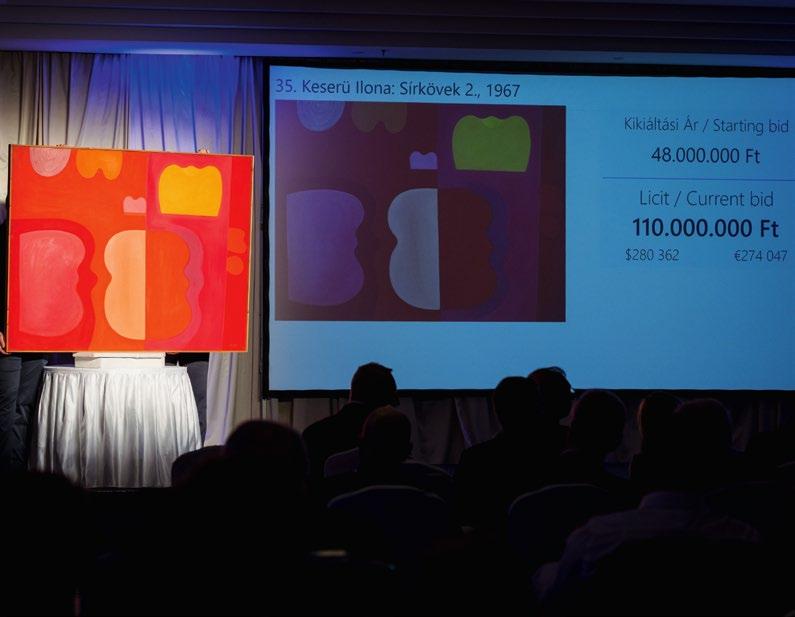
‘Gravestones 2’, a 1967 painting by Ilona Keserü, a world-renowned representative of the neo-avant-garde, soared – from HUF 48 million – past the auction record for living Hungarian painters, also held by a Keserü painting, ‘Marilyn and the Sea’, that had been sold for HUF 55 million. The now record-breaking Gravestones 2 is one of the painter's most distinctive motifs, one of the first ever treatments of the heart-shaped gravestones in the village of Balatonudvar.
According to Tamás Kieselbach, Keserü's large, red-pink-orange painting is a key work of exceptional quality in both scale and language. This is the first time the painting has appeared on the art market, and its discovery is an exceptional sensation, he said.
The
award was given to Natasa Stork, the lead actress of the Hungarian movie ‘Ice Cream Can Be Dangerous’ at the New York Film Week. Fanni Szilágyi's first feature film, released in mid-November, follows the
tumultuous relationship of an identical twins, both played by Natasa Stork. Made under the National Film Institute's Incubator Program, ‘Ice Cream Can Be Dangerous’ was first shown abroad at New York Film Week. Every year, the festival presents an international selection of films by established directors and debut feature filmmakers.
"I am very happy and grateful to director Fanni Szilágyi and all those who worked on this film. It's true in general, but even more so here, that it takes an amazing team effort to create a role. This award is a collective recognition. I hope that Hungarian audiences will also enjoy this sensitive and magical story," Natasa Stork said.
 Best Actress
Best Actress
The cargo handling facility at Budapest's Ferenc Liszt International Airport is planned to be enlarged in order to meet growing demand, according to the latest bulletin published by the airport's management company, Budapest Airport.
"The BUD Cargo City, opened by Budapest Airport in 2020, has handled record cargo volumes since its launch, and represents significant cargo growth potential for our partners and the Hungarian economy as a whole," the bulletin said.
“The key to continuous development and ensuring that Hungary remains a predominant cargo hub in the region lies in the BUD Cargo City, the hub of our cargo ecosystem, and the work of the cargo community as a whole. Budapest Airport and its cargo hub provides a solid foundation for all
Invitech and A1 Telekom Austria have built a faster, more secure and higher capacity redundant fiber connection between the Austrian and Hungarian capitals. According to the companies, the new backbone network on this route will provide the shortest and most secure connection between Western and Eastern Central Europe. By connecting Invitech's and A1 Telekom Austria's own fiber infrastructure over two redundant routes, the two companies will provide the shortest connection available today. Compared to the previous overhead infrastructure, the optical backbone network in the substructure provides data access between the two capitals with significant additional capacity and higher technical parameters, the
business news site hvg.hu reported. Invitech, the operator of more than 10,000 kilometers of optical backbone network in Hungary, intends to use the upgrade to move forward in the wholesale customer segment. According to Deputy CEO Albert Kis, the company can offer its customers a unique solution for the future transit needs of the region, in addition to enhanced data security.
The A1 Telekom Austria Group is expanding its extensive European fiber network with the development – its services will be based on the infrastructure of its subsidiaries in seven Central and Eastern European countries, in addition to its own backbone network.

players in the supply chain, including the 12,000 people who work in air cargo in Hungary today,” the company added.
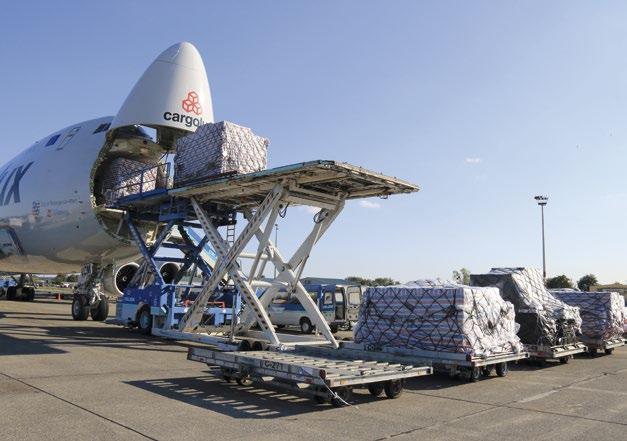
Due to the success of the BUD Cargo City, the time has come for further development. In September, the expansion of the cargo apron adjoining the facility commenced, and in October, the capacity expansion of the handling building also began. Budapest Airport Plc. is constructing an additional 6,500 sqm of warehouses, 2,000 sqm of offices, as well as a live animal holding area and other service facilities.
With the expansion, the airport’s annual cargo capacity will increase from 250,000 tons to 300,000 tons. This will ensure that Hungary continues to lead the way within the Central and Eastern European region, while providing a core competitive advantage for all players in the Hungarian economy.
As a result of energy-saving measures introduced by Spar Hungary and the modernization of its shops, the store chain's greenhouse gas emissions were reduced by 49% by 2021 compared to 2017 levels, the supermarket chain told the state news agency MTI.
The company said that during the renovation of the stores, fluorescent lighting fixtures were replaced with LED lamps, and this technology is used even if the entire building is not being modernized, but only its electrical system.
In 2018, Spar Hungary switched to new refrigeration
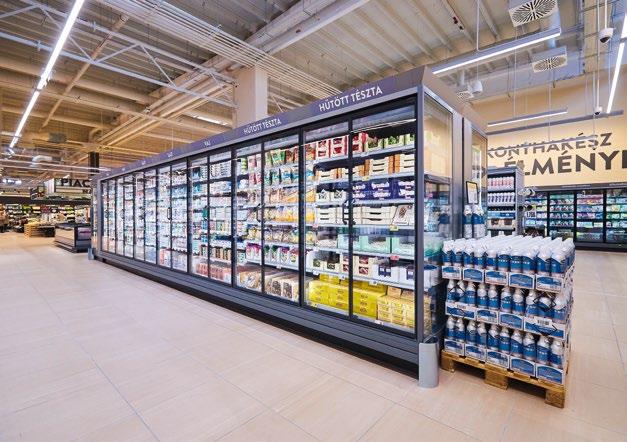
As the company's CEO, Imre Hancs pointed out, Festék Bázis won more than HUF 160 million in EU funding for the HUF 320 million development under the Széchenyi Plus program, which was accompanied by HUF 60 million of its own resources and HUF 100 million in loans.
The company produces 650 thousand liters of paint per year. Their products are sold in Hungary and can be found on the shelves of 70% of the country's paint shops, he added. In Vas County, they have sites in Jánosháza and Celldömölk.

The new production hall will produce solvent-based paints, and as part of the project, the production technology will be improved, which will enable them to produce paints that can provide electrostatic discharge (ESD) protection for treated surfaces, the CEO said.
He pointed out that the development is expected to generate a HUF 50-100 million increase in turnover from the first year, with plans to increase the current 43-strong workforce by 5-10 people.
technologies that are more environmentally friendly, more efficient and more economical to operate in the long term. Outdated store portals are replaced with modern types with good thermal insulation properties, and where justified, thermal insulation is carried out when replacing the waterproofing of roofs and façade insulation is also applied.
For each investment, the company will assess the possibility of effectively implementing a solar system to help meet the electrical needs of the unit, taking into account the building's specificities.
Electric car charging stations are continuously being installed at stores with parking facilities, with 168 such stations set up across the country so far, Spar said.
Spar Hungary Trade Ltd. achieved a turnover of HUF 791.8 billion last year, an increase of 7.2% compared to the same period last year. Its network includes more than 600 company-operated and franchised stores and employs around 14,500 people.
Festék Bázis [‘Paint Base’] Plc. is building a new 300-square-meter production hall in Jánosháza, Vas County, with EU funding and the foundation stone of the new facility was laid in the middle of October, the state news agency MTI reported.Vajda-Papír has donated a year's worth of sanitary paper products to the Hungarian Maltese Charity Service for three thousand people with disabilities. As they wrote, 22 residential institutions, 16 day-care centers and 27 support services of the Maltese Charity Service are supplied with hygienic paper products courtesy of the paper production company. The donation, worth more than HUF 30 million and weighing 10 tons, was
received by Imre Kozma, founding president of the Hungarian Maltese Charity Service, and the residents of the Budaörs House of Caring on Thursday at the charity's headquarters. The donated products – toilet paper, paper tissues and household paper towels – will be used to supply the entire network of the Hungarian Maltese Charity Service caring for people with disabilities for a year, they said.

A new production hall has been added to the ice cream factory of Unilever Hungary in Veszprém, doubling the production capacity of Magnum ice cream with sticks, the director of corporate relations of Unilever Hungary, Kálmán Molnár told the state news agency MTI.
He said that a new production line has been installed in the 3,400-square-meter hall, the investment is worth around HUF 10 billion. The current annual production capacity of 80 million liters will be increased by 15 million liters, with an annual capacity of 110 million liters planned by 2026.

The inauguration of the production hall also marks the 30th anniversary of Unilever's Veszprém unit, the director said, recalling that at the beginning the production capacity was 5 million liters per year. The company had invested EUR 200 million in Hungary by 2020, with a further EUR 100 million invested in the Veszprém plant and the Nyírbátor household chemical factory between 2020 and 2025, he added.
Magnum products account for a third of Unilever's ice cream sales in Europe. The new production line can make 720 sticks of Magnum ice cream per minute. This year, the Veszprém plant will produce around 600 million ice creams.

Unilever's Hungarian subsidiary was established in 1991. Unilever Hungary Ltd., together with
BlueVoyant, an industry-leading cyber defense company converging internal and external security, has opened a regional headquarters in Budapest. The headquarters includes a security operations center (SOC), which successfully monitors and protects the digital ecosystem of customers worldwide.
Unilever
Hungary: the Nyírbátor
Factory and
Röszke Food Factory. Unilever Hungary Ltd. employs more than 1,400 people in its Budapest office and in the three factories. According to publicly available data, the company's net sales in 2021 were HUF 99.4 billion and its profit after tax was HUF 2.89 billion. In the previous year, it had a turnover of HUF 95.2 billion and a profit of HUF 2.61 billion.
Unilever is present in more than 190 countries and reaches 2.5 billion consumers every day, making it one of the leading global players in the food, cosmetics and household cleaning products markets. The company's turnover in 2021 was EUR 52 billion.
A new Thyssenkrupp engineering development office was inaugurated in Szeged, SE Hungary reflecting the German behemoth’s effort to intensify related activities as part of its Hungarian operation. Up to 65 automotive engineers can look forward to be hired in the near future in three locations, Szeged being the flagship venue of the development. Being among the top 100 largest employers of the country, German Thyssenkrupp is present in Hungary with R&D and manufacturing capacities alike. Jászfényszaru is home to the production of steering servos and engine components, stabilizers and springs are made in Debrecen, whereas a running gear assembly plant is operated in Győr. Employing 1,100+ engineers, the offices in Budapest and Veszprém focus on R&D with the aim to boost global competitiveness. The automotive division of the company is associated
Diplomacy-n-Trade.ai 1 2017. 02. 27. 11:22:30
BlueVoyant, which provides unique cybersecurity solutions, has been present in Hungary since 2021. The company chose Budapest as the base for its European expansion and new SOC.
In Hungary, BlueVoyant is working with enterprises in the financial, media, and government sectors, and has already won the trust of prominent clients such as one of the five leading banks in the domestic market and one of the largest domestic media companies.
"Hungary was chosen from more than six possible locations to be the center of European operations, which is clearly a recognition of the local expertise and business environment,” according to György Rácz, president of BlueVoyant Europe and managing director of BlueVoyant Hungary. "Cybersecurity and the lack of qualified human resources are becoming more and more pressing issues in both the Hungarian and European markets, which is driving market players toward managed cloudbased services," he added.

with ‘smart’ driving systems that are suitable for collaboration with different driving-assistance and autonomous systems.


Thyssenkrupp Components Technology Hungary Kft. plans to increase the number of engineers employed by 10% within the next three years, and Szeged was one of the obvious choices for that purpose. The new office will be working closely together with the ones in Budapest and Veszprém to develop electronic hardware and software of state-of-the-art steering systems. The investment also helps internalize currently outsourced engineering activities.
As Managing Director Marc De Bastos Eckstein stressed, not only Szeged but also the whole region will benefit from this cooperation. The company’s presence brings more know-how and expertise to the city, and it helps provide a futureproof economic environment.
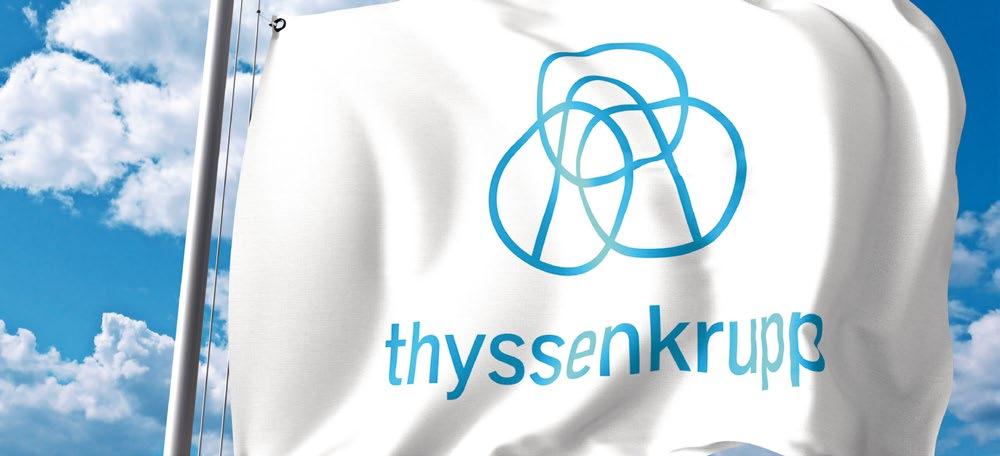
 BY TAMÁS MAGYARICS
BY TAMÁS MAGYARICS
The so-called midterm elections in the U.S. have not changed the political landscape dramatically. As for the Senate, the balance has not changed at all; no matter who wins the runoff election in Georgia, the Democrats have retained their majority. The razor-thin Democratic majority in the House has changed to a razor-thin Republican one. It is true though that the Republican majority can cause headaches for the Biden administration (and, personally, for the President himself if his son’s business deals get closer scrutiny), and that the left-leaning legislative agenda of the first two years of the administration is bound to be moderated or watered down. Nationally, both parties can draw strength from the results: while the Republicans beat the Democrats by more than three million more votes in the House elections, they lost a few governorships at the same time. Overall, political deadlock is here to stay.
If we move beyond the big picture, we can identify losers and winners on both sides. First and foremost, Joe Biden won the ’referendum’ on his presidency, if we consider the fact that his party lost narrowly in the House and retained its majority in the Senate – despite the fact that in a number of recent congressional elections, the incumbent president’s party suffered serious setbacks (like the ’shellacking’ of the Democrats in 2010). The Democrats were smart enough to turn the elections into a sort of referendum on Donald Trump instead. The former President can be counted among the losers: a number of
the candidates who were enjoying his support and endorsement from Mehmet Oz through Don Bolduc to Blake Masters lost – and, therefore, the Republicans have failed to take the highly competitive seats in Pennsylvania, New Hampshire and Arizona respectively. The losses may be ominous for Donald Trump as these are so-called battleground states, and the 2024 presidential contest may as well be decided in them. Moreover, the former president’s position seems to have weakened within his own party too. His approval rate has dropped among the Republican voters, and the camp of the ”Never-Trumpers” has grown – Trump has lost, after all, three recent elections (2018, 2020, 2022), his 2016 vintage ’magic touch’ has gone for all intents and purposes. What is also bad news for Donald Trump is the fact that the so-called independents tipped the balance in favor of the Democratic candidates in a number of contested districts, sometimes with a margin of 15-20 points. If this pattern prevails in 2024, then it will be an uphill battle for Donald Trump to regain the White House – provided he will be the Republican nominee at all.
A clear winner among the Republicans is Ron deSantis who beat Charlie Christ in the Florida gubernatorial race by some 20 points. His popularity among the Republicans has shot up nationwide too. However, according to stroll polls (like at the Republican Jewish Coalition meeting), Donald Trump is still ahead of him as the preferred potential presidential candidate in 2024, and some 40% of the core Republican voters are steadfastly behind Trump. A potential
sensible tactics for deSantis might be ’sitting out’ the 2024 election, and if Donald Trump loses (as it looks very likely at the moment), he might be the favored candidate in 2028 – in reality, given the ’cycles of American history’ (Arthur M. Schlesinger, Jr.), the Republicans would have better chances after eight years of Democratic presidency than only after four.
As for the Democratic party, the ’million-dollar’ question is whether Joe Biden will actually be running for president in 2024. If a visibly physically and mentally frail Biden runs in 2024, which – by the way – even the majority of the registered Democrats do not support, then the presidential election may turn out to be a kind of replay of that in 2016 in which the candidate with a lower negativity rate won only because he was seen as a lesser evil between two flawed contestants. Although Joe Biden’s potential challengers in the Democratic Party have not emerged yet, the successors of Speaker Nancy Pelosi and the Nos. 2 and 3 of the House Democratic leadership, Steny Hoyer and Jim Clyburn are already known. The change was in the pipelines, even if the Democrats would have retained majority in the House as quite a number of younger Democratic House members, including the members of the ’Squad’, have already voiced their dissatisfaction with some of the policies pursued by the octogenerian leaders. The new leadership reflects the diversity of the Democratic Party, Nancy Pelosi's place as No. 1. has gone to a Black man, Hakeem Jeffreys (NY), while those of Hoyer and Clyburn to a Progressive woman, Katherine Clark (Mass.) and a Latino
man, Pete Aguilar (Calif.) respectively. Though Nancy Pelosi, Steny Hoyer, and James Clyburn could not have been accused of Conservative tendencies, the composition of the new House leadership of the Democratic Party shows a shift towards the Progressives, that is, the left of the party. The rather lukewarm supporters of Donald Trump are also under attack in Congress for their perceived moderate policies; the everyday fight between the left of the Democratic Party and the right of the Republican Party is more likely than not will define the 118th Congress.
If we move beyond party politics and the consequences of the congressional elections for the careers of some top politicians, the question is whether the people in the U.S. are winners or losers. One thing is clear: the elections meant that democracy has won in the U.S.; the election process seems to have been fair and transparent (minor problems and complaints did happen but they do not affect the overall results). The U.S. has remained a society of 50-50, though. There does not seem to be a middle ground in a number of vital questions from handling and regulating immigration through the causes of inflation and high cost-of-living to gun control and security at home, especially in the large urban areas. The culture war is also going on in schools, colleges, and universities, as well as in the media. After a short lull, election campaigns are bound to be heating up rather soon next year with early winners and losers on both sides of the political spectrum.
Tamás Magyarics is a foreign policy analyst
HUNGARY BRANCH OFFICE Architecture / Engineering / Construction
www.takenaka.eu info@takenaka.hu
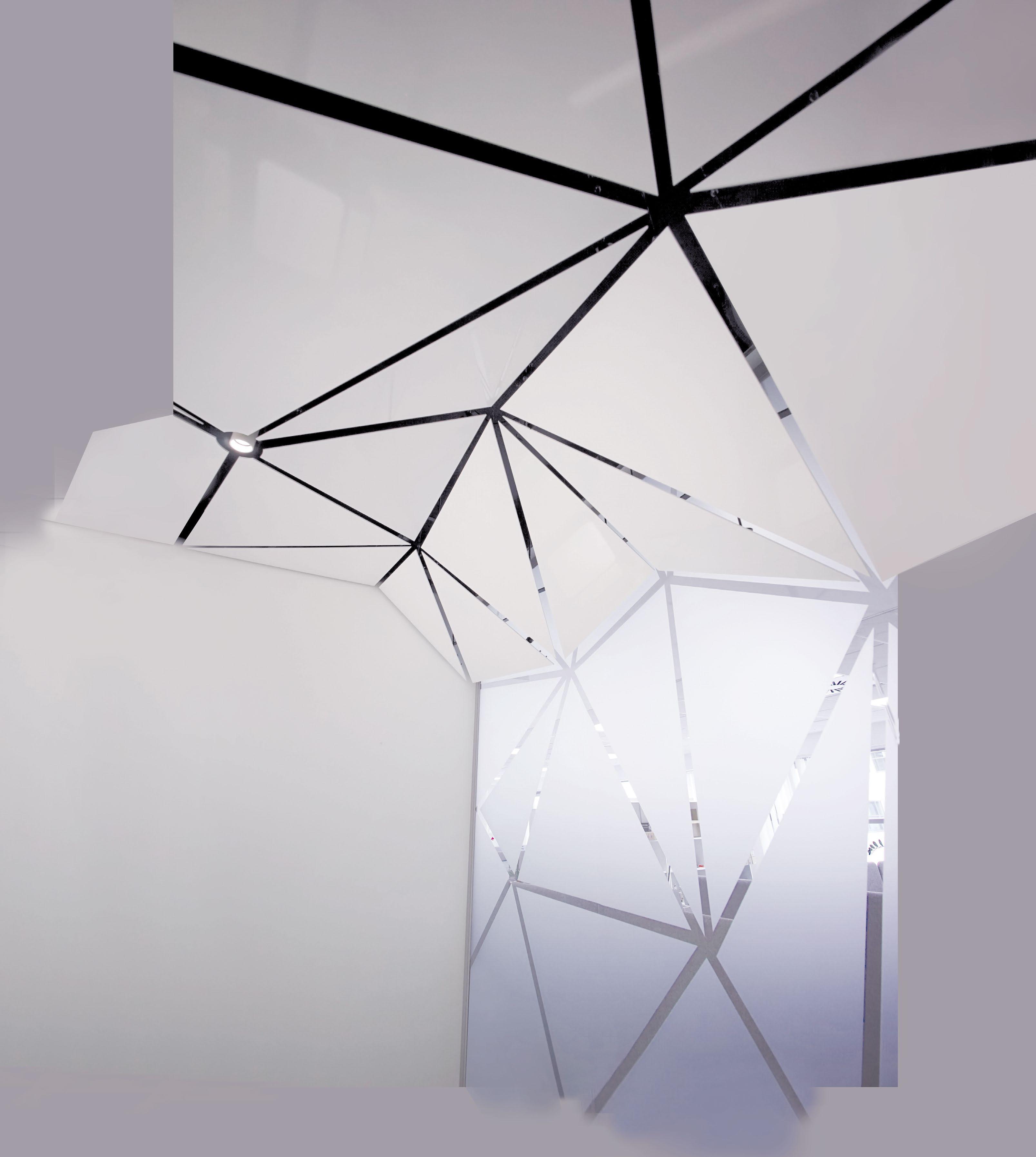
Facility management is one of the most important sectors of the Hungarian economy. The umbrella association of this profession in Hungary works on tackling the challenges of our times and on raising the overall standard in this industry.
As the President of the National Association of Facility Management, Building Operation and Maintenance Service Providers (LEO FM), József Schmidt explains to Diplomacy&Trade, this is a large sector, accounting for approximately 6-8% of GDP. “When you look at the fact that some 15,000 people are employed in LEO FM companies (this facility management profession), you can see that it is a dominant economic field, especially when you consider that more than 15 million square meters of space is managed by LEO FM members alone, which means that the entire profession in Hungary is of even bigger scope.”
Facilities management is a support service and does not only involve the physical maintenance of the building itself. “It includes everything that is related to the facility. It obviously mainly means maintenance services, which includes cleaning, security, gardening, technical operation and general maintenance. There are also additional services we provide that are not strictly facility management, like office catering, for instance. In addition, archiving and digitization, which takes place in the offices, are also included. This has been complemented these days by activities that are related either to renovation, refurbishment or fit-out, and prop-tech technologies are now also coming to the fore,” the CEO highlights.
LEO FM General Secretary Rita Istiván adds that not only is there a wider and wider technology background involved in the design phase, but it is also more and more characteristic of the operational part after the development. “There are very significant cost efficiencies that can be achieved if these are constructed as smart buildings.
Measuring and controlling the different points of use, different modes – all this provide continuous feedback. So, in terms of environmental protection and environmental efficiency, prop-tech is at the forefront: the more of these supports a building has, the more modern and the lower the cost of running it, and the better the uptake we can ensure that the workers feel comfortable,” she says.
The National Association of Facilities Management and Building Management Service Providers has a history of almost a decade. It was founded in 2014 to help the industry communicate in a unified way, to create professional standards and transparency in the facilities management market, and to raise the overall standard in the industry. It plays a central role in creating a knowledge hub based on cooperation between market players, supporting professional training and education, and developing jointly developed state-of-the-art solutions. Maintaining the level of service is greatly helped by the organization’s own benchmarking survey, which is now in its fourth year. József Schmidt stresses that their benchmarking research has been very successful. Pointing to the fourth edition of the book containing the latest results, he says the publication includes over a thousand properties and the characteristic numbers of those properties, “which is very important because it's the kind of survey that only exists in the United States. There is no such publication in the European Union, either, thus, the European facility management body Euro FM is also interested in what kind of benchmarking data we Hungarians publish every year. In addition, it was a big step forward to compile the collection of legislation on operations in this field and to keep updating it month by month. Our members receive this free of charge and external partners can purchase access to it. Beforehand, everybody was just trying to gather this information from different sources.”
He points out that workforce – the fluctuation, the retention of employees – is also a big problem for the member companies of the LEO FM association. “There is a common thinking in this area, we have launched an HR survey on wages, benefits, and we update it every year. We also have education and training as our flagship activity. We have established contacts with several universities, the first of which is the Budapest University of Technology's Institute of Advanced Engineering Training, where we have signed a cooperation agreement on a partnership in training courses like facility managers, facility management and EU facility managers. We are currently negotiating with the University of Physical Education, where we could possibly join the operation of sports facilities, as currently there are no proper operating rules for swimming pools, sports halls, ice halls or football stadiums.”
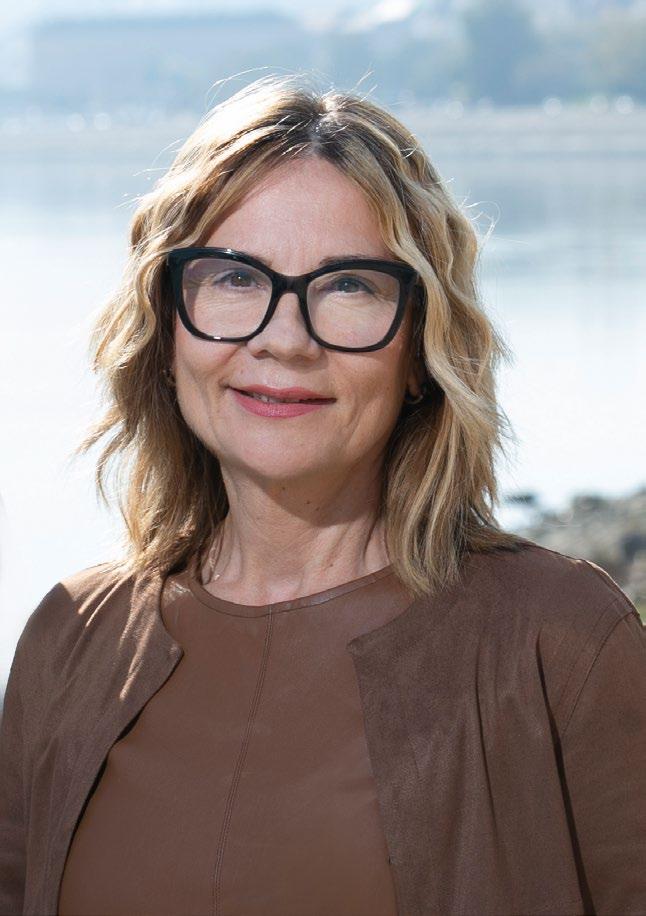
Today, sustainability is becoming increasingly important in all areas of business. As to what ways and to what extent this is a challenge in the facility management profession, the CEO stresses that “as responsible business leaders, it is important for everyone to be aware of the environmental impact. We think that using renewable energy here is about using products and tools in facilities management that do not have a negative impact on the environment. We in the association are also partners in this. Some companies also have green cleaning labels – national eco-labels – where they use different environmentally friendly products and reduce water use. This is continuously validated year after year. We, as LEO FM, would also like to have a similar certification system in our operation.”
With the new coronavirus pandemic (hopefully) over, the facility management profession, like other areas of business, face a new challenge, the Russian war in Ukraine. While mentioning the difficulties, the LEO FM officials are optimistic about growth opportunities in their business field.
As Rita Istiván emphasizes, the facility management profession is still needed. “The more development there is, the more new areas can be captured in the market. We did not expect a war to break out, but it is now a reality and has a big impact on the situation we are in. This time, it is not a pandemic situation, it is a war situation. As soon as the pandemic was over, another monster reared its head.” József Schmidt notes that one of the factors of concern is that the price of numerous materials have gone up. “The sharp depreciation of the Hungarian currency is affecting prices, especially the cost of stationery, various equipment and tools that have to be used for maintenance and renovation. The price of fuel has risen, and energy, especially gas and electricity, has also become much more expensive. Again, this is causing an increase in costs for everyone, and company managers will obviously decide how much of the operating costs will be spent on energy and how much will be spent on operating costs and service charges. That is why the work of our organization’s energy working group has been valued. We believe that out of operation expenses, depending on the activity, between 30 and 60% are currently utility costs, the rest was a purchased service. If we can reduce that gap, maybe our partners can buy more services from the saved amount. If we reduce it, they might think about spending not just on repair, but more on planned preventive maintenance. I don't want to make any predictions, but I am sure that the facility management profession will continue to play an important role in Hungary,” he concludes.

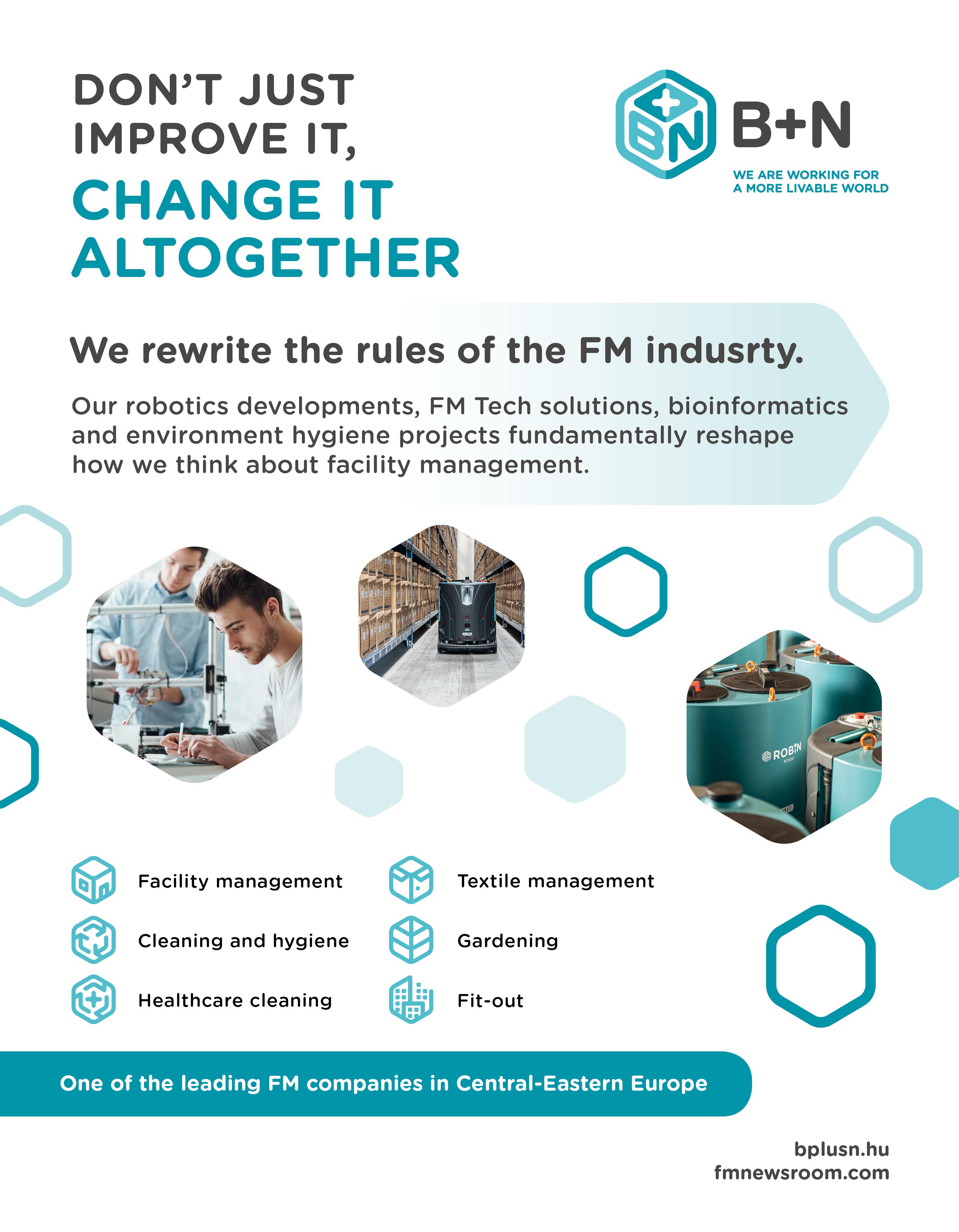
Celebrating its 20th anniversary next year, Dome Facility Services Group has been providing comprehensive, integrated facility management (FM) services to the Hungarian real estate market while adhering to its proven values.

Characterizing the domestic FM market and Dome’s role in it, Gábor Décsi
MRICS, Managing Partner at Dome Group, highlights to Diplomacy&Trade that “in the past 20 years, the Hungarian FM market has been developing a lot almost from the scratch. Since the FM industry is quite new all over the world, by now we hit the average international standards in terms of professionalism. Looking around the regional FM markets in some aspects, we are ahead of other countries. In details, in Hungary the market prefers integrated FM services, and the SLA-based quality measurement is wildly applied. In Hungary, in terms of the innovation capabilities, the applications of cutting-edge technologies, and implementation of the modern industrial solutions, I believe that Dome is always in the leading position. One fine example for that is that today’s most frequent topic is the energy crisis and Dome’s energy advisory division, Dome Energy is already 12 years old! For us, the development and maturity of the Hungarian FM industry is always a top priority since our credo is that the bigger the cake the larger our proportion. Therefore, we are spreading the best practice and not hiding from our competitors.”
Facility management is a support service. In this respect, Gábor Décsi says his company believes in the one stop shop concept that means providing all the services that relate to any of the building’s expenses. “We cover such a wide scope that even listing all is almost impossible. But to show the complexity, here is a list of the services we provide: Technical FM (maintenance, troubleshooting, dispatcher etc.), Infrastructural FM (cleaning, security, landscaping, roadworks, winter services, pest control, etc.), project management, CAPEX management, energy advisory services (procurement, reconciliation, optimalization etc.), FM advisory (technical DD, FM audit etc.). The required capacity and the professional knowledge for all the services we provide can be found inhouse. This means that we are operating a large organization with a full scope of professionals.”
The Dome Group highlights four values as the most important: professionalism, market orientation, partnership and people-centered approach. As to how these appear in the dayto-day activities of the company, the Managing Partner stresses that “we use these values in our day-to-day life like a lighthouse for the ships or a compass or a bible. This means that during our professional life – with both the clients and the employees –, we behave, react and think according to our values. Say if we suddenly stop when coming across an issue and we don’t immediately know what decision to make or what the proper answer would be, we usually think of our values and we suddenly
get the right answer. Another example is that we set up and operate what we call ‘social aid fund’ for our colleagues who live in poor conditions and in every semester, our employees are entitled to apply for financial help if a financial difficulty arises in their private life.”
Dome Group is a founding member of the 21st FM European Alliance. As Gábor Décsi explains,
this Alliance is a very prosperous cooperation between independent and locally strong FM companies. “The basic idea to bring the Alliance to life was that more and more multinational and even more global enterprises outsource their FM services to regional or global FM providers. On this market, there are only a few FM service providers who can compete and all the local players are disqualified from this game if there is no alternate solution. That is
why we established the alliance in 2016. We already have won large FMCG multinational FM outsource tenders and there is also ongoing progress for further FM mandates.”
In addition to the general facility management activities, Dome Group offers energy management services under the Dome Energy brand, as the Managing Partner mentioned, and leasehold development services under the Dome Fit-out brand, while its Dome Real Estate Consulting business provides a full range of facility management consultancy services. Regarding the benefits all this means for the Group’s facility management customers, Gábor Décsi points out that “our vision of the cooperation with our customers is that we strive to build strategic partnerships. This means that we do not have hundreds of clients, but with those clients we began to work for, we usually get more and more buildings, sites, and projects. This concept brings the need to develop a wide range of real estate services. On the other hand, this cooperation makes life easier for both parties, there are no long procurement processes, the quality is permanent, and the clients can always rely on a strategic FM partner. This strategy might also be why we do not often lose mandates. The churn rate is very low, and this is one of the key success factors of the constant 20% per annum growth rate in the past almost 20 years.”
Nowadays, sustainability is important in basically all fields of business. “In the real estate industry, ESG (Environment, Social, Governance) initiatives have appeared in recent years, primarily from the financial aspects. Nowadays in our industry, almost everything resonates ESG, so our life is also affected by its elements. Through our long-lasting activity in field of energy with the environmental aspects in mind, we are deeply involved in different projects on our clients’ side. This is the Environment aspect. As for the Social element, since Dome Group is a large employer with more than 750 employees in our company, the support and the management of our employees are crucial and is one of the most important cornerstones. To put it simply: our product is our staff, so we have to treat them like we treat our treasure. Finally, the Governance part comes through the outstanding leadership of the entire Dome Group’s management. We always take care of the long-term value creation instead of the shortterm one-off profit items. We are all motivated to build a strong and stable enterprise,” he says.
Now, with the pandemic (hopefully) over, the facility management industry is looking forward to further growth. “Usually in this sector, one used to say that the annual growth potential is around the annual inflation rate. This trend was valid for the past two decades. However, both the pandemic and the current energy crisis show that the role of facility management in the real estate market is much more important than many people thought. We are the experts of health safety issues, energy consumption issues, the hybrid workplace topics and so many other areas. So, I believe that in the next two decades, the growth potential will be at least double the average GDP growth rate,” Gábor Décsi concludes.

The 100% Hungarian-owned Future FM Facility Management Corporation provides full-ranging facility management services all over the country. Since 1991, their scope of activity has gradually increased in accordance with the changing demand of the market and their customers.
As the CEO of the company, Zoltán Mikó explains to Diplomacy&Trade, the facility management market itself is a very large one, with a huge number of service providers, but not all of them offer complex service packages to their partners. “Future FM is in that narrow segment of the palette that can offer cleaning and security services, technical operations and other complementary service ranges entirely in-house, either as a whole or starting in parts and adding a portfolio element later on. Our strength is that we can mobilize a very large number of in-house resources for these tasks. We have a workforce of over 2,000 people in this respect.”
The Deputy CEO for HR, Katalin Takács, adds that the basic concept has always been the same throughout the company's more than three decades of existence: "trying to provide solutions to our clients for all activities that are not part of their own portfolio. It is important to be in partnership with our clients so that they entrust us with everything else and they can concentrate on their own activities. This concept, which is still valid today, has resulted in all the solutions and full service we provide.”
The CEO points out that facility management is the set of services that support the core business. "When there's a crisis, everyone should focus on survival and, if possible, keep the core business going as long as possible. Companies are more inclined to cut back on any other external costs, thinking that without those, it will be easier to survive. Facility management service providers can try to help in this playing field. On the one hand, they can find resources on the cost-cutting side, ones that can be approached and unlocked from the efficiency side. If necessary, they can suggest reducing the content of the service, together with the partners, so that costs can be handled better.” This is the facility management side, but there is also the labor market problem, Katalin Takács notes. “As Zoltán mentioned, our company is working with a workforce of about two thousand people. A significant part of that staff is physical workers: we have cleaners, security guards, maintenance workers, etc. This category and this layer of the labor market is now in quite a serious crisis. It is because there was a period when a lot of people who do this kind of manual work left for abroad. The other reason is that there has been insecurity and a wage spiral that are pushing the boundaries of what can be achieved in a market like this.
A significant proportion, about three quarters of the workforce, is over 55 years of age. Meanwhile, it is very difficult to recruit new colleagues. There are very few people who are really serious about getting into these jobs. We,
on the other hand, must survive every day and deliver the service we have undertaken to provide, which requires a stable workforce every day.”
In addition to the specific facility management tasks, the Future FM group is also active in the field of security services and fleet management. “The need for these things always emerged when we were carrying out our initial job, cleaning. Then, it turned out that it would be nice to change the light bulb or manage the boiler, maybe water the flowers or do the garden in front of the office building. Our experience shows that there are
more and more customers who ask for help with these issues, and we always try to answer these. So, it is the client needs that have brought about these portfolio expansions,” she highlights.
As Zoltán Mikó stresses, “in a market of security companies with a very, very long history, we have the opportunity to have a share because we are more flexible. We have a much deeper relationship with our partners, a better understanding of what they need but not getting, what they should be doing a little bit differently in a service like this. Or, let's say, in our fleet service, we have built-in service elements that the partners don't get elsewhere as part of a package of the same quality or the same extent.”
The Future FM managers say they very much appreciate the feedback they get from customers and this helps them to improve their services.
As an example, Katalin Takács mentions that they are in charge of facility management tasks at the Hungarian capital’s Ferenc Liszt International Airport. “We are very proud of this job. There, we had to take an ownership stake in the operating company itself that does the operations and we have made that company part of our group, and that is also due to our flexibility. If a need arises, we bring the solution. This flexibility has been an unchanged value for three decades: we always adapt to the situation and to the customer. I think that this tailoring and personalized service is quite typical of our group.”
Nowadays, companies are increasingly expected to work in a sustainable way. Concerning this issue, Zoltán Mikó explains that in addition to
general energy-saving things “for example, we have been jointly operating a photovoltaic solar park at one of our partners with almost one megawatt capacity for five years now. So, it's not that we're riding on the now trendy wave, we set up such a park five years ago. We have been able to implement a water consumption reduction project, which is probably unique in Hungary, in that building, whereby the temperature can be programmed and managed to be periodically controlled. If one of our partners has these kinds of requests or ideas, we can either do it ourselves or we can find partners together.”
Since 2016, it has become a tradition for Future FM to select an organization each year and help run its operations. According to Katalin Takács, “the most important thing in the company's CSR policy has always been to try to support a good cause in a way what we are good at. One example is the Suhanj! [‘Whoosh!’] Foundation, which we supported on a regular basis. They have set up a gym where disabled and able-bodied people can train together. We have provided mechanical assistance to help them set up their air conditioning system, as well as specific cleaning products to ensure cleanliness and hygiene. Or there is the Bátor Tábor [‘Camp Courageous’], another of our returning partners, who we also supported with hygiene products, or provided classic financial support, for instance, when they wanted to renew their ropes course. Also, we renovated the bathroom of a gentleman in need, in order to make his daily life easier. In helping people's lives in this way, we have a very kind partner, three-time Olympic fencing champion Áron Szilágyi, who is our CSR ambassador.”
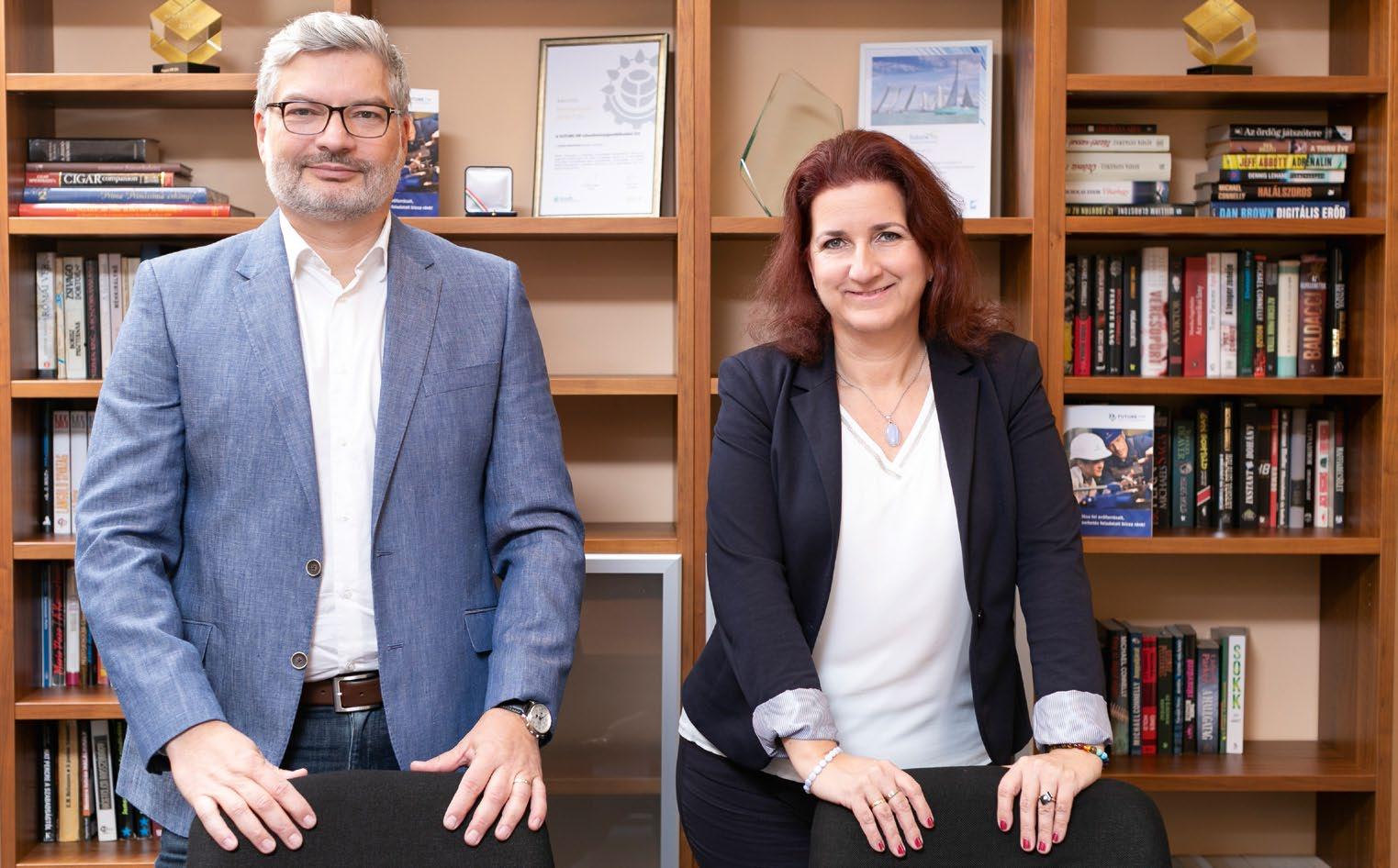
B+N Referencia Zrt. has a history of almost three decades and has grown into Hungary's leading facilities management company. For years, it has been consistently featured in the ranking of the 500 Hungarian companies with the highest turnover. The Chief Executive Officer of the company, Ferenc Kis-Szölgyémi tells Diplomacy&Trade about the company’s development, their tailored and flexible services and how they became a regional market leader.
“Our company has a history of almost 30 years. In the beginning, we only provided cleaning services. For years now, we have been the market leader in the domestic facilities management industry. We have 8,500 employees in Hungary,” the CEO starts with a brief introduction of the company.
As to what values and experience have contributed to this spectacular growth, he stresses that transparency and transparent operations are core values for his company. “We employ all our staff as employees. Our most important base is our blue-collar colleagues. We launched the ‘Take Notice’ campaign a few years ago in recognition of their work. We think it's important to recognize that without them, we wouldn't have a clean, safe and aesthetically pleasing environment in our offices, factories and vehicles. We believe that everyone needs a healthy and livable environment, and we do our utmost to promote sustainability. To this end, we are constantly improving our work processes and methods to minimize our impact on the environment. We believe that the technology we use must be put at the service of sustainable development. We carry out the tasks we undertake on time, on budget and to the best of our ability. For us, customer focus means that our services are tailored and flexible, and our work processes are transparent.”
B+N Referencia Zrt. offers its clients a full range of facility management services. Explaining what they mean by this ‘full range’, Ferenc Kis-Szölgyémi highlights that their portfolio of services covers the full range of facilities management, from cleaning to technical operations and maintenance, from fit-out services to landscaping and textile and uniform management.
Over past few years, economic actors have been facing numerous challenges resulting from the new coronavirus pandemic and the Russian aggression in Ukraine, just to name two of the most important ones. One of the main challenges affecting facility management companies has been securing a properly trained workforce. As the CEO puts it, providing qualified staff is a major challenge for B+N Referencia Zrt. as well. “At the same time, being a market leader and a stable, reliable and continuously growing company gives us a significant competitive advantage. Our client portfolio is extremely broad, and we provide services to state and municipal institutions in
addition to numerous international and domestic companies. We provide our employees with a wide range of benefits, from continuous training to various social and financial benefits. Just to give one example, in July 2022, we became the first in the FM sector to introduce the domestically developed ‘Salarify Pay’ solution, which allows our employees to access a portion of their salaries during the month. This means
they can tailor their paydays to their own wallet. All this is quick and easy, via an application.”
Regarding feedback from customers and how much this helps the company improving its services, Ferenc Kis-Szölgyémi notes that the vast majority of feedback from customers is positive. “Of course, we have detailed,
comprehensive quality assurance and control mechanisms in place on a daily basis. Let me give you an example from our most important ‘customer’, the travelling public: according to a survey by the independent international quality control institute ASQ, Airport Service Zrt. – the main activity of which is cleaning services provided by B+N Referencia Zrt. at Budapest’s Ferenc Liszt International Airport – has achieved an excellent result in this area. Our company is a specialist in airport cleaning in the Central and Eastern European region. In addition to Ferenc Liszt International Airport, we are also responsible for the cleanliness of Vaclav Havel Airport in the Czech capital, Prague.”
B+N Referencia Zrt. is the only facility management company in Hungary with a research and development (R&D) department. In explanation of how the operation of such a department benefits the company as a whole, the CEO points out that they set up their R&D department several years ago “and today, we have 25 highly qualified employees there. It's no exaggeration to say that through their work, we are shaping the future of the facility management sector, in line with the ‘Industry 4.0’ philosophy. In addition to our day-to-day operations, we are also ensuring the continuous improvement of our services. I am convinced that technological innovation has an increasingly important role to play in this traditional sector. Technological innovations by this department are now available to the entire international group. These include the autonomous industrial cleaning robot ROBIN, launched in 2019, and the mobile UV disinfection device developed in 2020. In the near future, a revolutionary technological breakthrough, metagenomic analysis and prediction, will enable us to detect pathogens on different surfaces. This method will allow rapid detection of infectious colonies and prevent a possible epidemic. This unique development will drastically reduce the risk of infection in hospitals and increase patient safety while in the workplace, it protects the health and safety of workers.”
The company became a regional FM provider in 2021 and is now present in seven countries. According to Ferenc Kis-Szölgyémi, the international expansion was a logical continuation of the company’s market leadership position at home. “In 2021, we acquired the ISS Group's interests in the Czech Republic, Slovakia, Romania, Slovenia and Hungary. This was followed by the acquisition of INWEMER in Poland in January 2022. We have 100% ownership of our local companies in all countries. With these steps, we are the market leader with full coverage of the Central European region. With nearly 21,000 employees, we cover 16.5 million square meters of space.” He adds that being present in international markets means continuous learning and knowledge transfer. “We have successfully integrated the acquired companies into our company. We have developed a coherent strategy and harmonized day-to-day operations. Our size, which is now also significant at European level, and our broad service portfolio offer our clients a number of advantages. Our synergies and cost efficiency give us a strong competitive advantage in all markets.”


IN THIS SERIES, DIPLOMATS SHARE PERSONAL ACCOUNTS OF THEIR EXPERIENCES ON “EXCURSIONS” into Hungarian culture, art, gastronomy & scenery.
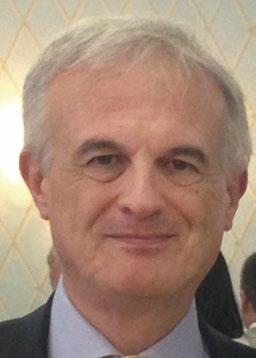
When my transfer to Budapest was announced in October 2021, I felt great joy and satisfaction, as I would be completing my diplomatic career in a country with a long and glorious history whose people have been linked to the Greek people for centuries. Thus, I arrived in Budapest on January 19, 2020, full of appetite and enthusiasm for my new post. I was, however, unlucky. A month and a half later, the pandemic of COVID-19 hit; as a result, everything came to a halt.
However, the few outings I managed to make during this short period were enough to confirm that I was lucky enough to live in one of the most beautiful cities in the world, which I had visited as a tourist in April 2006. It is worth remembering that the first time I learned more about Hungary was thanks to football in 1966 (I was nine years old), when my team, Panathinaikos, played against Ferencváros of Flórián Albert. A few years later, in 1971, Panathinaikos, coached by Ferenc Puskás, played in the final of the then European Championship at Wembley.
In high school, we learned about the Hungarian Revolution of 1848, statesman Lajos Kossuth and poet Sándor Petőfi. The great composers Ferenc Liszt and Imre Kálmán are very well-known in Greece.
At some point, the coronavirus passed. Thus, I started to explore not only the capital but also other parts of Hungary. I loved walking along the banks of the Danube and admiring the view of Buda with the Matthias Church, the Fisherman's Bastion, the Buda Castle, the Gellért Monument, the Gellért Baths and other extraordinary buildings – a pleasant walk on the, now closed, Chain Bridge, which leads from Pest to Buda and vice versa. What can anyone say about the Fisherman's Bastion, from where
you have an incredible view of the city and the magnificent National Assembly building? Sometime last Christmas, I was hosting some friends who suggested that we go to the Fisherman's Bastion in the evening. That was it. What an incredible beauty to see Budapest from above! The illuminated National Assembly building reflected in the waters of the Danube and the Matthias Church standing there, covered in lights and history. And to add something practical for the visitor: it is in the evening, unlike in the morning hours, that there are plenty of parking spaces in this area. Apart from Buda, I explored the area of Pest, where, by the way, my residence on Andrássy Avenue with its beautiful buildings is located. I was lucky that the residence is located directly opposite the Opera House. Like all Ambassadors, I was invited, to its opening ceremony of the building after the completion of the renovation work on March 12 this year. As a Greek, I was particularly moved to see around the Opera House statues of the Nine Muses whose names are written in Greek.
In Pest you can admire the majestic St. Stephen's Church and other beautiful buildings, such as the National Assembly, the Academy of Sciences, the Hungarian National

Museum and the Museum of Fine Arts. In Budapest, I am utterly impressed by the interior decoration of many buildings, such as the National Assembly, the Opera House and several hotels. Real works of art! But also, the museums of the Hungarian capital piqued my interest. Both the National Museum of Hungary and the Museum of Fine Arts have masterpieces. I have recently seen the exhibitions of Matisse and El Greco. In addition to Budapest, Hungary has many more beautiful cities with a special character. The Danubian Szentendre and Vác, Visegrád and Esztergom with its magnificent Basilica, Eger with its famous wines, Debrecen and many others. I also love Gödöllő and its palace museum. In Visegrád, you can admire the panoramic view from the castle and see the bend of the Danube. Before the Second World War, Greeks had most of the riverboats on this river. Anyone visiting Budapest considers it an obligation to take a short cruise on the Danube to admire the city from a different perspective. I personally prefer the night cruise, which allows you to see the buildings clearly and admire their style.
Another advantage of Budapest is the variety of its restaurants. You can eat very well for a few or a lot of forints. The luxury restaurants are
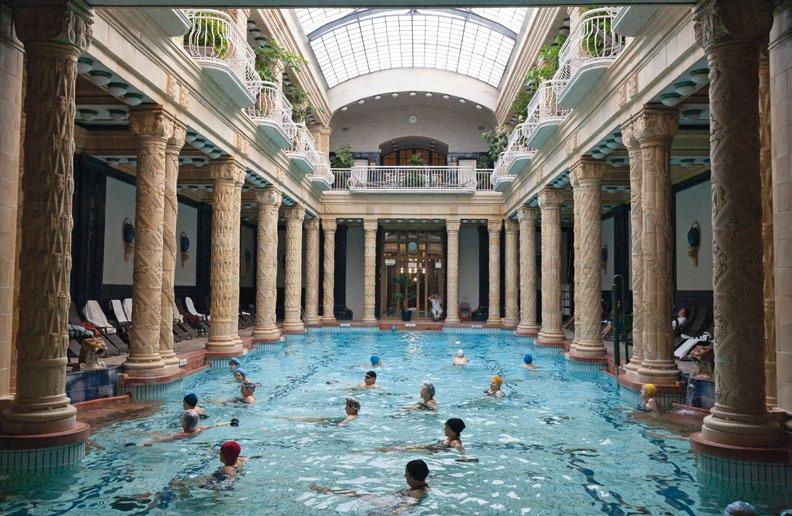
nice. But I also like the small taverns in different corners of the city, offering traditional Hungarian dishes.
Connections from the past Living in Budapest and visiting Hungarian cities, I was able to see the centuries-old relations between the Hungarian and Greek people. I wonder how many people know that, of the crowns made during the Byzantine Empire, only two have survived and they are in Hungary! The lower part of the symbol of the Hungarian nation, the Holy Crown of St. Stephen was made in Constantinople in the 11th century and was given by Emperor Michael 7th Doukas to Prince Géza I of Hungary. As is known, this Crown is prominently placed in a hall of the Hungarian National Assembly. The names of the saints depicted are written in Greek.
The other crown, this time Byzantine, is that of Emperor Constantine IX Monomahos (‘Monomakhoszkorona’ in Hungarian), who reigned from 1042 to 1055. This crown is in the Hungarian National Museum.
Margarita, whose name was given to the very beautiful Danube Island (known in Hungarian as ‘Margitsziget’), was a Hungarian princess and the daughter of King Béla IV of Hungary and Maria Laskarina, who was a Byzantine princess.
Looking into more recent years, we
come across the activity in Hungary of György Sina and his son Simon Sina. This family contributed financially to the construction of the famous Chain Bridge, as well as other buildings, such as the Hungarian Academy of Sciences in Budapest. It should be noted that, with a grant from Simon Sina, the buildings of the Academy and the Observatory were built in Athens. This family also owned the palace of Gödöllő, which they donated to the imperial couple in 1867. Other Greek families lived and worked in Hungary, such as, for example, Muráti, Szacelláry and Haris.
In the past century, many Greeks came to Hungary during the Greek civil war (1944-1949) and thereafter. As their children and grandchildren have informed me, the Hungarian people supported them, so that, despite the many difficulties, they were able to get back on their feet in Hungary, thus contributing to its social and economic development. Many of these Greeks settled in Beloiannisz, a village outside Budapest.
Coincidentally, the area where the village is located once belonged to György Sina and was called ‘the village of the Greeks’ (‘Görögfalva’).
Concluding this three-year period in Hungary, I will return to Greece with plenty of pleasant memories. I will definitely visit the country again. I feel Budapest as my own city and one that I could easily live in. I would urge my compatriots to visit Hungary, to get to know the wonderful people and a country, which is packed with history, natural beauties and unique monuments.
Nagy köszönet Magyarországnak, Budapestnek és a magyar embereknek a csodálatos évekért, amelyeket ebben a vendégszerető országban töltöttem.
[A big ‘thank you’ to Hungary, Budapest and the Hungarian people for the wonderful years I spent in this hospitable country.]
at our largest faculty, the Faculty of General Medicine, the number of students enrolled there in the first year is something like 1,100. This means that it is one of the largest medical universities in the world as far as the training of general doctors is concerned. Actually, the majority of the students in the Faculty of General Medicine are already foreigners. We have 440 Hungarian students, because we have a contract with the state and we take that many every year, while of the other 700 or so, half attend courses in German (mainly from Germany, Switzerland and Austria, of course) and the other half are enrolled in Englishlanguage courses. The latter course is very diverse, with a notoriously large number of students from Norway, Israel, South Korea and Japan. The largest numbers are from Japan, South Korea and recently China."
In addition to the training specialism, Dr. Béla Merkely says the university's popularity is also due to the high level of education, with strong theoretical training alongside a renewed patientfocused clinical training, and the value of this degree. "So, when young people choose a college, they look for one steeped in tradition. Many of them are not even from within the European Union and they have to take a national licensing exam first. In Israel or the United States, for example, the success rate for this exam is very high, well over 90%. As a result, everybody wants to go to a course where they can get a diploma that will give them access to the best places."
Semmelweis University is currently in cooperation with more than forty universities worldwide. "We have cooperation agreements
For the first time, a Hungarian university has been ranked in the top 250 of the Times Higher Education (THE) world rankings. The Budapest-based Semmelweis University has improved 41 places on last year's result and is now ranked in the top 250 in the latest world rankings.
A statement by Semmelweis University notes that it has moved up significantly from last year's range of 250-300 to the 200-250th position, making it the highest-ranking Hungarian university again. Traditionally, this world ranking looks at five areas: educational environment, research, citations, industry income and international orientation. Semmelweis University has improved in most indicators, most notably in citations and research. The university is ranked 64th among the higher education institutions of EU Member States, typically outranked by German, French and Belgian universities.
According to the Times Higher Education, “Semmelweis University in Budapest, Hungary, has been a leading biomedical higher education institution, a center of research excellence and healthcare provider in Hungary and Central Europe for over 250 years. Its mission based on the integrity of education, research and development and patient care has made it a regional center of excellence in the field of health sciences. The university offers academic programs that provide extensive and solid theoretical knowledge as well as competitive practical skills in medicine, dentistry, pharmaceutical sciences,
health sciences and conductive education. The diplomas issued at the university are officially recognized in the European Union and in many other countries around the world.”
The Times Higher Education is one of the best known and most accepted world university rankings, Rector of Semmelweis University Dr. Béla Merkely tells Diplomacy&Trade. “I have been rector here for four years now and over that time, we have moved up from 491st to 236th, which means we are in the top 250. Bear in mind that there are about 28-30,000 universities in the world, so we are very much in the top one percent, and that puts us on the top in East Central Europe."
The number of those enrolled is around 13,600, of which 35% are foreign students from about a hundred countries from around the world. The fact that the university has achieved such popularity beyond national borders and has such a good reputation, is, the rector notes, due to it being a 250-year-old institution of higher education with a long tradition. "At our university, training is specialized in health science and medicine. For example, if you look
with well over a hundred universities, including 40 universities worldwide we have very close working ties with. The relationships that date back the furthest are with German universities from Heidelberg to Freiburg, but I could also list other major institutions from Imperial College to Oxford, Leuven, Leiden, Karolinska Institute, the University of Vienna, the University of Zurich or even the University of Bern. The list also includes Harvard, Stanford, Mayo and Duke in the United States – universities with which we have close links,” he adds.
The latest example of a cooperation ‘alive and kicking’ is the agreement they have just signed with Harvard University located in the state of Massachusetts in the United States.
As the rector explains, “this involves a oneyear postgraduate training course for medical colleagues working in universities in East Central Europe, starting here in Budapest and finishing in Boston after an online course. So, it's a kind of Semmelweis bridge to Harvard and the graduates of this course get a degree from Harvard. Of course, the lecturers are predominantly from Harvard Medical School, but we are also in the faculty, and thus, we can really demonstrate that Semmelweis University is a leader in this training structure.”
What makes medicine hard is that you have to cope with the doubling of the amount of science in two years, the rector claims. “So, if I learn medicine now, in two years' time, I will have to start all over again, because by that time, the same amount of knowledge has been accumulated. This is why it is crucial for a doctor, if he or she wants to be on top of treatment and diagnosis, that they keep learning – it is a lifelong learning process.”
According to a cooperation agreement signed by Harvard Medical School (HMS) and Semmelweis University (SE), HMS will design and implement a postgraduate clinical research training program in medicine at the university. The program, scheduled to start in July 2023 and run until June 2026, will be accompanied by three residential workshops: the first in Budapest, the second online and the third in Boston. The US institution will be responsible for the curriculum and delivery of the training, and SE has committed to cover 50% of the fees for 50 students per year, for which the institution has earmarked a budget of USD 250,000. The curriculum will help participants acquire the skills needed to conduct high-quality clinical research. These include epidemiology, biostatistics, medical ethics and professional leadership.
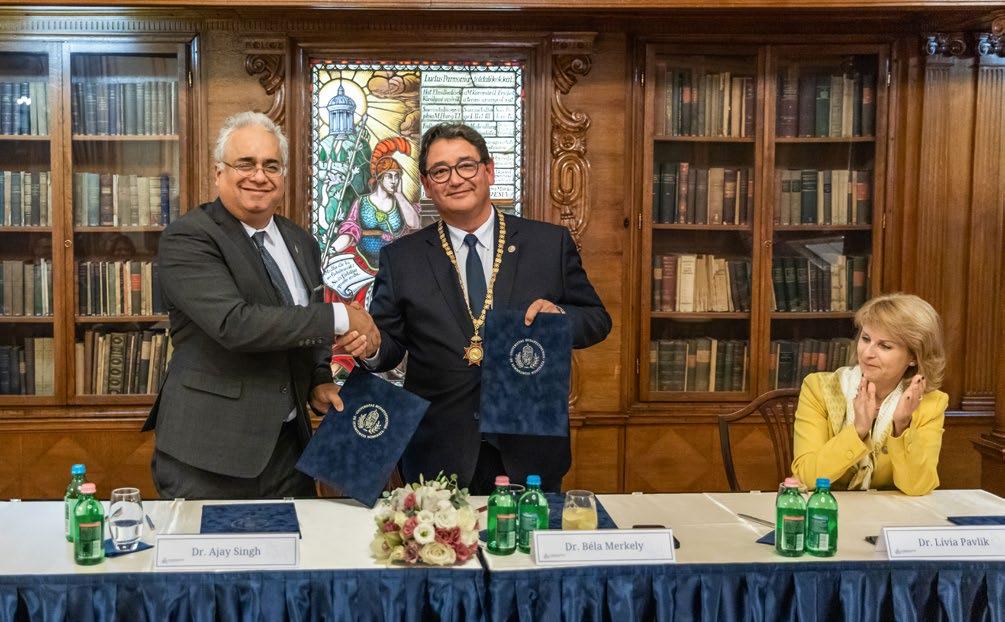
Ajay K. Singh, Associate Dean for Academic Affairs at HMS, said in a press release that clinical research is a real driver of healthcare innovation and improves patient outcomes. “By providing high-impact training opportunities for healthcare professionals around the world, we are realizing the HMS mission of supporting a diverse and accepting community whose primary goal is to alleviate suffering, improve health and well-being," he added.
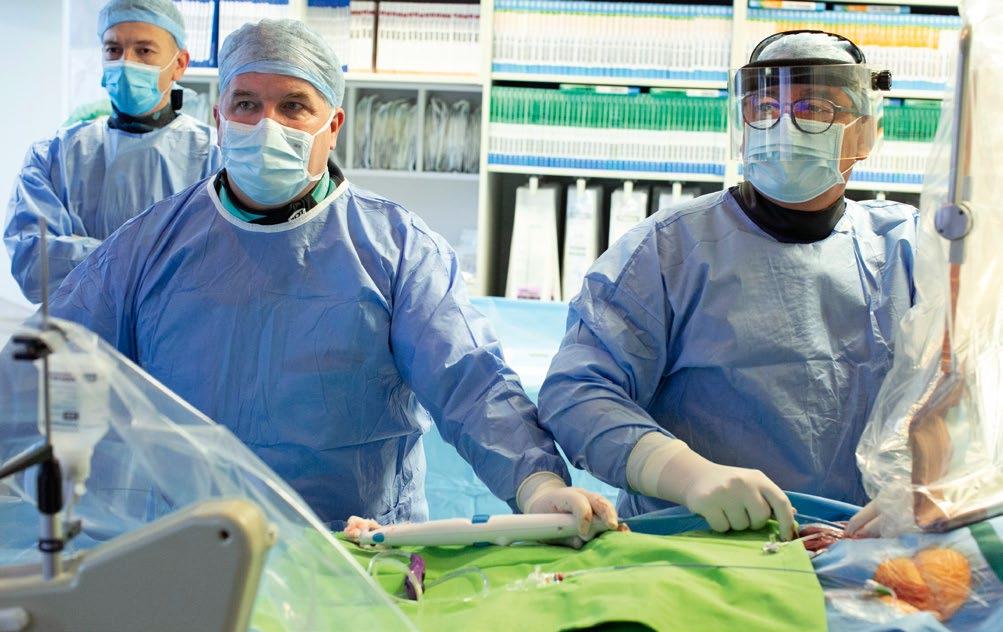
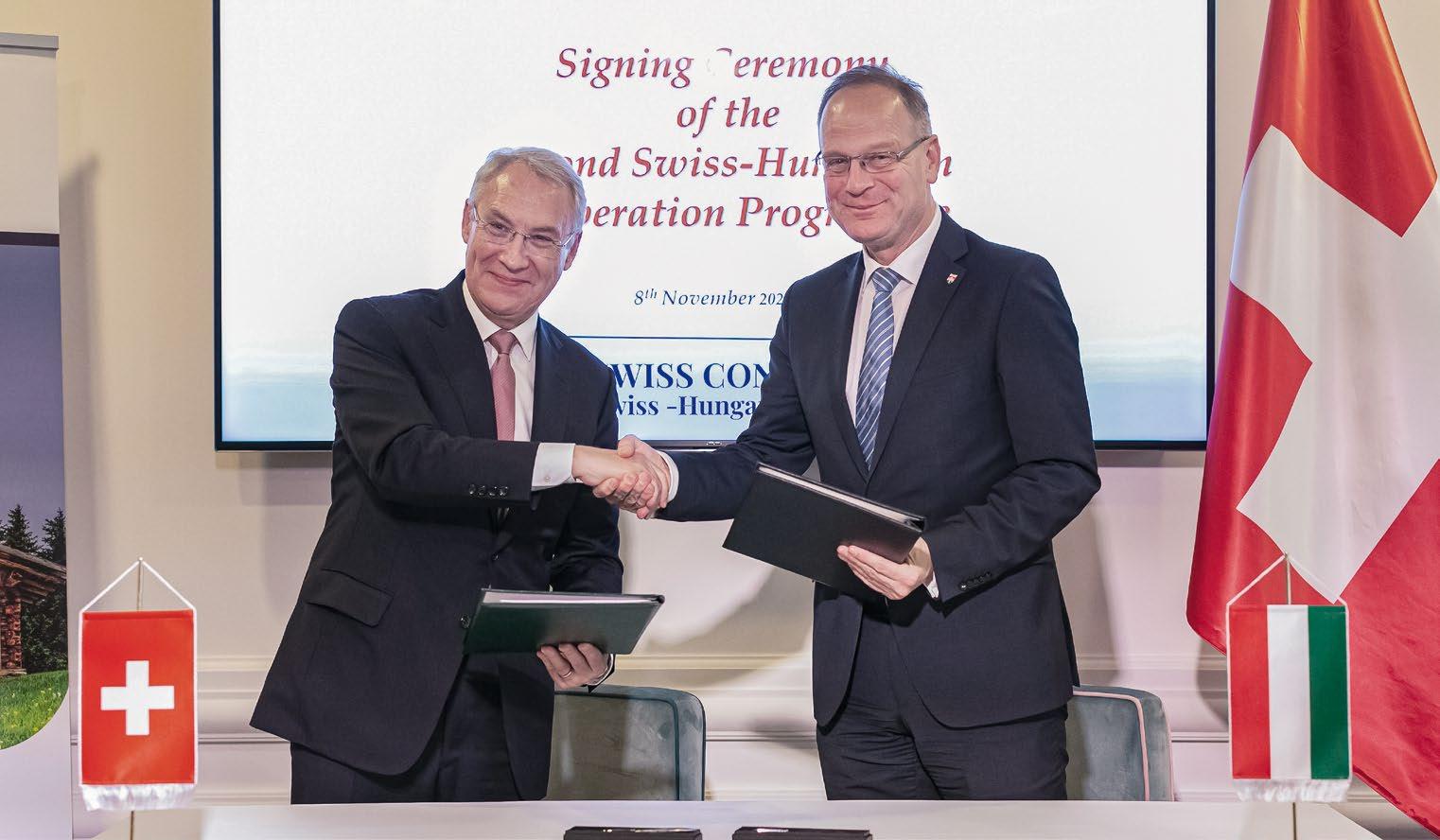
The Swiss Ambassador to Hungary, Jean-François Paroz and the Hungarian Minister for Regional Development, Tibor Navracsics officially signed the Framework Agreement for the new Swiss-Hungarian Cooperation Program in Budapest this November, in the presence of Ms. Andrea Studer, Assistant Director General of the Swiss Agency for Development and Cooperation.
The program, which is part of Switzerland’s second contribution to selected EU member states, aims at reducing economic and social disparities in Hungary. The Swiss Embassy considers the signing of the agreement as an important milestone in the long tradition of cooperation between Switzerland and Hungary.
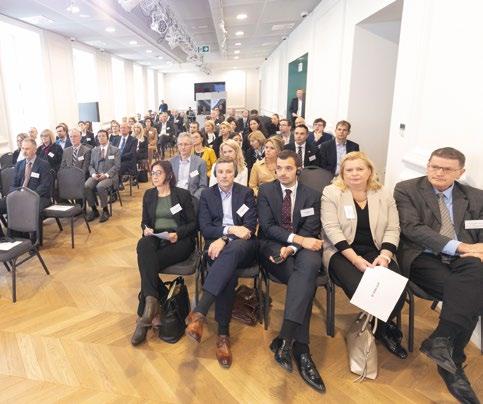
Based on the historically good relationship between Switzerland and Hungary, the new Swiss-Hungarian Cooperation Program will further strengthen bilateral cooperation through the direct involvement of governmental
and non-governmental organizations and enterprises from Switzerland and Hungary, the Embassy says. The new program will be implemented between 2022 and 2029, building on the success of the first Swiss Contribution. The second Swiss Contribution to Hungary amounts to CHF 87.6 million – which comes to about HUF 40 billion including national cofinancing – and at least 50% of the Funds will be dedicated to less developed regions of Hungary.
The aim of the cooperation program is to contribute to reforms in Hungary and to promote existing and new Swiss-Hungarian partnerships. The Swiss contribution focuses on areas in which Hungary has a proven need and where Switzerland can create added value with its expertise and experience. Thematically, it will focus on vocational education and training, research cooperation, SME support, fighting against human trafficking, investment in energy efficiency and renewable geothermal energy, water and wastewater management, health and social protection and minorities.
Speaking before the signing ceremony, Hungary’s Regional Development Minister
Tibor Navracsics said that this is the renewal of a successful cooperation that had already brought tangible benefits to Hungary, and that he hopes the new series of programs will be equally fruitful and productive.
He added that the programs could include a number of areas among the projects to be supported which could lay the foundations for Europe's future and that Hungary and Switzerland are not indifferent to the future of Europe and the European nations.
He noted that an excellent network of relations had been established with Switzerland. The signing of this agreement is a symbolic act which will both deepen bilateral relations and add another value to the existing broad range of European cooperation, the Minister said.
The Swiss Ambassador to Hungary, JeanFrancois Paroz, pointed out that this signature opens a new chapter in bilateral relations, intensifying cooperation between Switzerland and Hungary in a number of areas.
In her welcome speech, Andrea Studer, Deputy Head of the Swiss Agency for Development and Cooperation, highlighted that the signing of the agreement was an important step in Swiss-Hungarian cooperation, further strengthening the relationship between Switzerland and Hungary.
Under the Swiss contribution, established in 2006, the Alpine country has granted a total of CHF one billion to the ten Member States that joined the European Union in 2004 to reduce economic and social disparities and to help catch up lagging regions. These financial contributions are a key part of Switzerland’s European policy. Although it is not a member of the EU, Switzerland participates in the EU’s internal market and in the free circulation of persons thanks to an extensive set of bilateral agreements with the EU. During the first period of the program, the contribution to Hungary amounted to more than CHF 130 million.
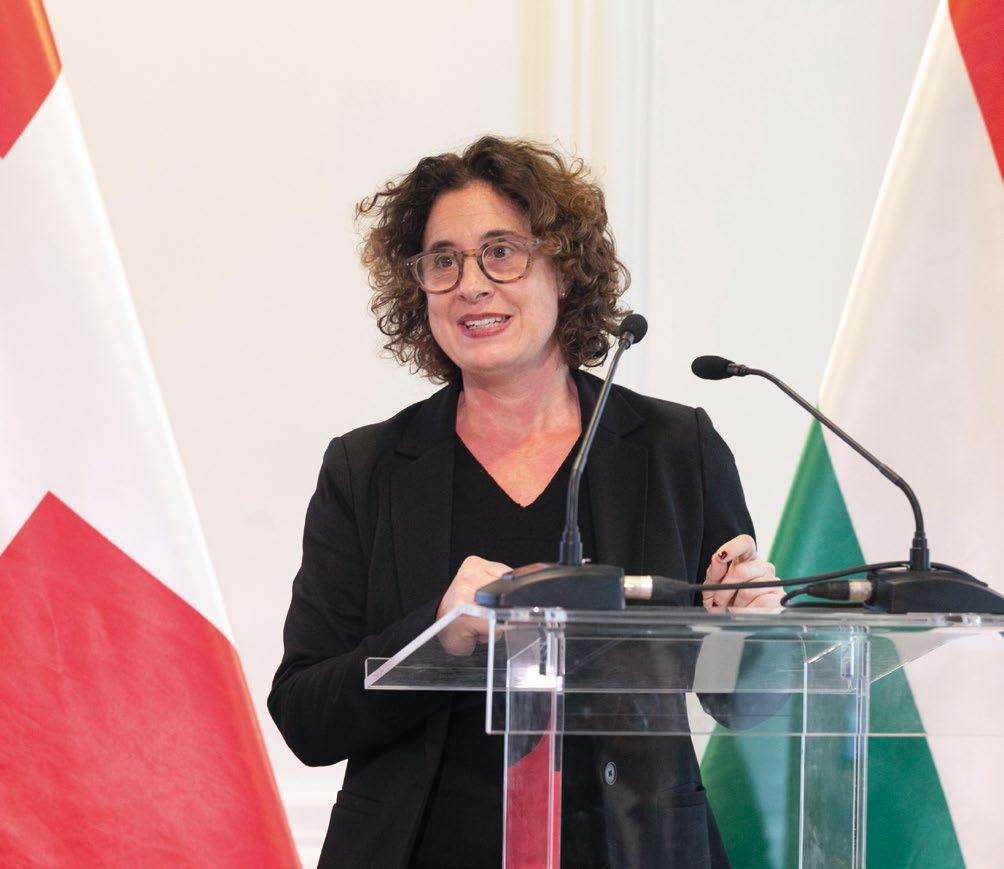
The estate's creator, Pál Debreczeni, set out to build the winery with a vision no less ambitious than to put the name Vylyan on the map of the wine world. He was an exceptional man, one of the visionaries who first realized the hidden potential of Villány. He brought a fresh, progressive, western approach to the wine region. Instead of the vibrant center of the southern Hungarian wine region, Villány, he chose to establish the estate center in nearby Kisharsány, thus signaling his attachment to the vineyards. For the first wave of plantings, he brought in an international expert and designed the brand's image with an artist from Bordeaux.
He worked hard to build the estate. His energy, perseverance and often unusual decisions were met with amazement by those around him, but the winery's early successes proved him right. Right away, in 1994, Vylyan's first great wine, a Kékoportó (the variety has since been renamed to Portugieser), was awarded a gold medal at a prestigious international wine competition. In 1995, the winery's estate wine, the much-loved Montenuovo Cuvée, was born, followed in 1997 by the first bottle of Duennium, Vylyan's flagship wine. One of the winery's proudest achievements came in 2006, when it won the 2004 Pinot Noir Regional Award at one of the world's most prestigious international wine competitions, the Decanter World Wine Awards. However, 2004 not only brought Vylyan a beautiful wine, but also a terrible loss as the founder, Pál Debreczeni, passed away tragically.
The estate’s management was taken over by his wife, Mónika Debreczeni, who until her husband's death, was responsible for the company's sales and export markets. There was never any question of continuing what Pál Debreczeni had started. Mónika Debreczeni brought a new dimension to the life of the winery, her love of the arts soon becoming part of Vylyan company creed. Today, the winery believes that above a certain level, wines, like works of art, have a personality of their own. From the very beginning, they have believed that wine and art go hand in hand and have consciously sought parallels between them.

In addition to the unique qualities of the terroir, their founder, Pál Debreczeni, said that it is the faith, knowledge and openness of the strong team behind Vylyan that drives them forward day by day and will eventually put Vylyan’s name on the map of the wine world. Perhaps it is this legacy that has guided the winery through the bumpy road of the past 30 years and continues to fuel their desire to innovate to this day. Their curiosity leads the winery into new and unknown territories. The wines of the Variation family are a testament to this, slightly different from their usual range, but still bearing the hallmarks that make their wines unmistakably Vylyan: elegance and vitality.




JULY 11 AND 12, 2023, BUDAPEST ARENA
Rammstein are stepping up the pace and their European Stadium Tour will be returning in 2023 for a third time.
What this means has already been reported in many newspapers – a stage construction that sometimes towers over the stadium roof, a show lit up with fire and flames, a perfectly orchestrated band, the humor and pathos of the Rammstein staging – all this is indeed unique in the world of music in terms of style, magnitude and quality. It is thus only logical that Rammstein offer all their fans and those who are about to become fans a fresh chance to experience their "gigantic show" (Rolling Stone) live, which makes European "stadiums rock" (Nordkurier), with "lots of fireworks, lots of bangs and smoke" (Sueddeutsche Zeitung). livenation.hu
MARCH
For more than 60 years, Spanish tenor Plácido Domingo has enchanted audiences around the world with his distinctive and emotive voice, having appeared in more than 4,000 performances and concerts in more than 150 roles. He has also appeared in three famous opera films, Rosi's Carmen and Zeffirelli's La Traviata and Otello. The world-renowned opera singer is also a conductor, having conducted more than 600 opera performances and symphony concerts.
The singer-conductor, who is still very active at the age of 82, has a special relationship with Hungary and is an international mentor and supporter of the Virtuosos, the Hungarian classical music talent contest. As well as meeting the Virtuosos talented youngsters frequently, Domingo also helps them to launch their careers, and the lucky youngsters have already had the chance to perform at several international concerts under his baton.
In 2020, he also sat on the jury of the talent show, which was broadcast in five countries.
The concert in March 2023 will feature classical and well-known opera pieces, with the maestro accompanied by the Budafok Dohnányi Orchestra. A special feature of the evening will be a guest appearance by his son Plácido Domingo Jr. and the winners and special prize winners of the 2022 Virtuosos Talent Competition. broadway.hu

Every year since 2008, Müpa Budapest and the Budapest Festival Orchestra have put on an all-day marathon production presenting the very best work of a given composer, with a series of consecutive concerts from morning until late evening in the Béla Bartók National Concert Hall and the Festival Theatre. From Bach and Brahms to Bartók and Bernstein, many prominent composers have taken the starring role on these days – with Beethoven already serving twice, for example. The 2023 marathon will focus on Sergei Prokofiev, who passed away 70 years ago. The Russian composer wrote exciting symphonies, concertos, chamber compositions and piano pieces, among other works, so we will be able to present a rich cross-section of his diverse œuvre to our audience over the course of the day. Students of the Liszt Academy will perform free concerts in the Glass Hall, while memorable performances will be brought to life on the screen in the Auditorium. mupa.hu
MAY 21, 2023, BUDAPEST ARENA
Diana Krall is the only one jazz singer to have eight albums debut at the top of the Billboard Jazz Albums chart. To date, her albums have garnered two Grammy® Awards, ten Juno® Awards and have also earned nine gold, three platinum and seven multi-platinum albums. Krall's unique artistry transcends any single musical style and has made her one of the most recognizable artists of our time. As The New York Times recently noted, Krall possesses “a voice at once cool and sultry, wielded with a rhythmic sophistication.”
Born in Nanaimo, near Vancouver, the singer grew up in western Canada and started playing the piano at the age of four. By the age of 15, she was performing in local jazz bars and became engaged in music at the encouragement of her father. She was still a teenager when she was awarded a scholarship to the prestigious Berklee College of Music in Boston. His debut album was released in 1993, followed by three more albums in the following years, but the watershed came in 1999 with the release of When I Look in Your Eyes. The album topped the Billboard jazz charts for an unprecedented 52 weeks and went platinum in the US and Canada.
After her triumphant success at Veszprém Fest, Diana Krall will be back in the Budapest Arena for her seventh Hungarian show next May. livenation.hu
